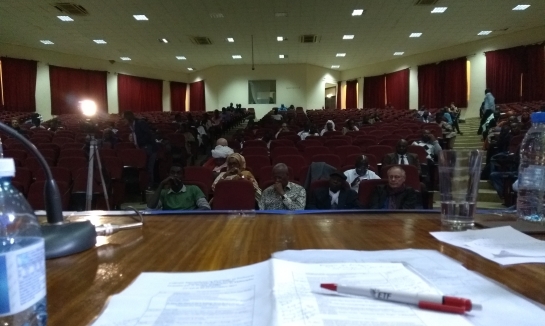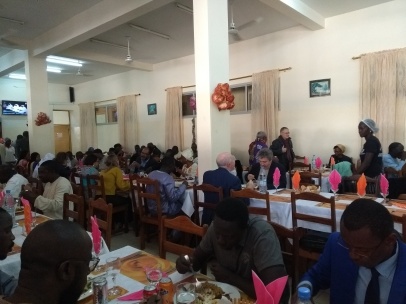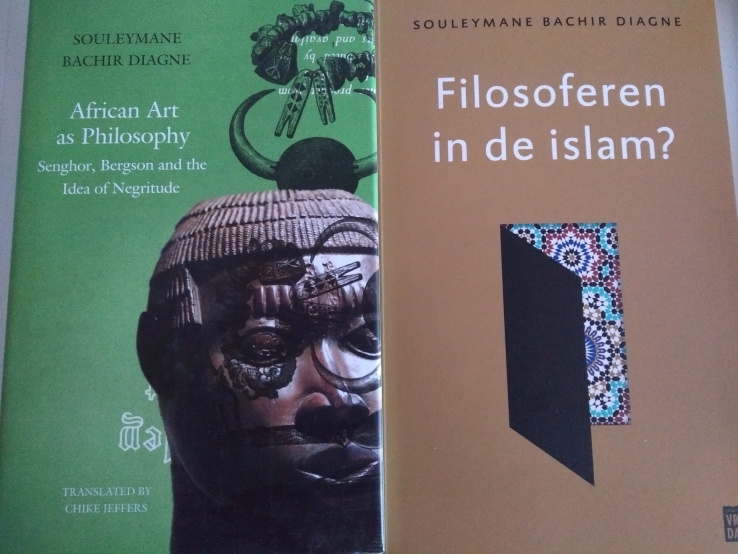The gentle force of translation
In philosophy the 21st century started in 2017. This became clear to me in the days before Christmas, when I had the opportunity to attend the great conference in honor of Souleymane Bachir Diagne at the University Cheich Anta Diop in Dakar. It was there that I saw something of the way ahead for philosophy in the coming age – beyond the need for ‘schools of thought’ of the past century – beyond the melancholic returns to the ‘great thinkers’ and ‘systematic’ philosophy, and beyond the need to split up the field in something called ‘analytic and continental’ thinking. Beyond the self-aggrandizement of philosophies that claimed to end history, to make a radical new start, introduce a new ‘school’, or to even destruct philosophy itself. This new, fresh, orientation I witnessed, had nothing of that – instead it boasted all things modest: doing serious historical work, analyzing the intertwinements of religion, politics, and culture patiently and honestly, and above all: working on translation in the broadest sense – making little known texts and views a bit more well known, introducing ‘marginal’ thinkers and their work to a wider audience – and in all that: shifting the geographies of reason silently but significantly.
Beyond the self-aggrandizement of philosophies that claimed to end history, to make a radical new start, introduce a new ‘school’, or to even destruct philosophy itself. This new, fresh, orientation I witnessed, had nothing of that – instead it boasted all things modest: doing serious historical work, analyzing the intertwinements of religion, politics, and culture patiently and honestly, and above all: working on translation in the broadest sense – making little known texts and views a bit more well known, introducing ‘marginal’ thinkers and their work to a wider audience – and in all that: shifting the geographies of reason silently but significantly.
And how I liked the way it was thought out and done: to honor a mans achievement in his own country, to do so when he is still years before retirement and may expect time to allow him to inspire others more and bring his unique views into the world. This conference breathed, above all, the atmosphere of intellectual friendship – an atmosphere that spread through all the events and meetings of so many colleagues, students, and relevant others.  We were in the ‘francophone’ sphere of the African continent: in a sphere and in a place – opening a space for thought. But English was a conference language too, and mostly well understood. Wolof often served to accomodate the organizational processes of course. And I was lucky to also be able to retreat for a while in my own language, Dutch, with colleagues from NL I only truly got to know in Dakar, as such things go. So, the issue of translation was never far away – especially because the man who was the centre of it all, fondly called Bachir by his friends, embodies the issues of translation in his life story – so to speak. Having moved to ‘the capital’ – Paris – of so many postcolonies for his studies, he later returned to Senegal to strengthen the philosophical world in place through his powers of translation – only to move once more (much later) to another ‘capital’ (New York) – that of American-dominated thought, to translate African and islamic philosophy and make it more accesible to an academic world still very much ignorant to its potential and real contributions to a shared and negotiated understanding of the predicament of the 21st century. Thus also repairing what was worded by Frantz Fanon: “whenever there is a lack of understanding between [the black man] and his fellows in the presence of the white man, there is a lack of judgment.” (Black Skin White Masks)
We were in the ‘francophone’ sphere of the African continent: in a sphere and in a place – opening a space for thought. But English was a conference language too, and mostly well understood. Wolof often served to accomodate the organizational processes of course. And I was lucky to also be able to retreat for a while in my own language, Dutch, with colleagues from NL I only truly got to know in Dakar, as such things go. So, the issue of translation was never far away – especially because the man who was the centre of it all, fondly called Bachir by his friends, embodies the issues of translation in his life story – so to speak. Having moved to ‘the capital’ – Paris – of so many postcolonies for his studies, he later returned to Senegal to strengthen the philosophical world in place through his powers of translation – only to move once more (much later) to another ‘capital’ (New York) – that of American-dominated thought, to translate African and islamic philosophy and make it more accesible to an academic world still very much ignorant to its potential and real contributions to a shared and negotiated understanding of the predicament of the 21st century. Thus also repairing what was worded by Frantz Fanon: “whenever there is a lack of understanding between [the black man] and his fellows in the presence of the white man, there is a lack of judgment.” (Black Skin White Masks)
Translation is never only finding words in another language to transmit what was expressed in the original one, nor just presenting little known thinkers to a wider audience – its most important, philosophical, work is negotiation, one of the central elements of dialogue and working to shared understandings. It is stirring things up almost unnoticed, working towards the growth of knowledge – and against the ideological falsehoods that have blinded many great thinkers.  Involved in such negotiation Souleymane Bachir Diagne critically investigates thinkers such as Senghor and Bergson, Iqbal and Thierno Bokar, – meanwhile fearlessly researching how religion and modernization, democratic movements, searches for identity as well as equality, interact, mix, and may be used as ways to open up towards ourselves and each other.
Involved in such negotiation Souleymane Bachir Diagne critically investigates thinkers such as Senghor and Bergson, Iqbal and Thierno Bokar, – meanwhile fearlessly researching how religion and modernization, democratic movements, searches for identity as well as equality, interact, mix, and may be used as ways to open up towards ourselves and each other.
Translation, as practiced in Diagne’s work, is a gentle force, and very much needed to open the future to what our varying traditions of knowledge have been trying to discover about humanity. Now that we, in the 21st century, in our ‘post-colonial’ age, are doing the work of realizing the crimes we have done to and suffered from each other – we can finally start to learn differently. Not just reaching for ‘excellence’ in monological ivory towers of reason, but mastering another kind of excellence – the one that consists in the craftmanship of reading (listening!), translating (transferring) insights – in the budding multi-centered system of knowing that is presently being built. This kind of excellence is modest as well as daring, as it knows philosophy is not just about intellectual grasp – but is aiming to acquire such a grasp while working against inequality and injustice, and for wisdom and love.

Pingback: Black Issues in Philosophy: Postcolonial Encounters in Dakar | Blog of the APA